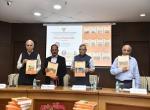Swami Narasimhananda, monastic member, Ramakrishna Math & Mission, and Editor, Prabuddha Bharata, monthly journal of the Ramakrishna Order started in 1896 by Swami Vivekananda, gave a talk on ‘Hindu Studies in India and Abroad: Problems & Prospects’, as part of the VIF Lecture Series Understanding Indian History & Civilization on 15th March 2019.
The speaker first described the current state of Hindu Studies and noted that there are broadly two trends that can be noticed. One is that of traditional scholarship, which is practiced by pundits, shashtris and others, who not only study the texts, but also share the cultural context in which these texts were composed, and the content of these texts still largely form a part of their daily praxis. The second trend is that of the academic scholarship on Hinduism, which is largely dominated by Europeans and Americans. The latter exists mostly in the English language and the practitioners are divorced from the actual practice of Hinduism. On the other hand, some of the traditional Indian scholars even consider it a blasphemy to discuss Hindu texts in English, and some of them cannot converse in any contemporary idiom.
Thus, as far as the academic study of Hinduism is concerned, we are studying books written by people, who have taken the study out of its context. For instance, an academic, who might write tomes on the agnihotra sacrifice, has perhaps no idea about its practice, but his/her scholarship nonetheless remains quite rigorous. It is not that all Western scholars are biased against Hinduism, but they do not necessarily have the means to access the deeper meaning of Hindu practices. Taking the study of Hinduism out of its proper context leads to a bigger problem: some very far-fetched claims on the part of some academics, for instance, claims like Yoga and Tantra are not Hindu practices, Hinduism itself is not a religion, and so on. The speaker pointed out that in Eastern traditions, thought is based on praxis; therefore, without apprenticeship or tutelage of a person who knows through praxis, any attempt at “Hindu Studies” would lose all meaning.
The speaker also pointed out that there are many problems with us as practicing Hindus. For instance, we have failed to produce a certification system that would validate or authenticate scholarship on Hinduism. Secondly, it has been quite some time now that we are no longer under colonial rule, yet we have failed to bring about any radical change in the education system. The University Grants Commission, for instance, has for a long time, declined proposals for opening of Religious Studies departments in some institutions. We do not even encourage Indian students to work on themes that would advance the cause of Indian knowledge—for instance, in Philosophy departments in Indian universities, it would be more fashionable to work on Wittgenstein than to work on G R Malkani! Thirdly, whenever we have any objection to any translation or book written by foreign scholars, they ask back if we have produced any better work. The answer is in the negative in most cases, and the reason for this is lack of team work, lack of funds, and so on. Furthermore, we are still lagging behind in popularizing our own textual resources. There is no online resource on Tukaram’s Abhanga (which runs into thousands of verses), for instance. The Gita Press has, however, done a great service by popularizing Hindu texts.
A possible way out could be that we need to train our traditional scholars in the modern idiom, and firstly we need to identify such scholars. According to Swami Narasimhananda, we need to build a bridge between the Western and shastric idioms. Religious Studies departments in many Western universities now want more diversity and are open to criticism of their tradition of religious studies scholarship. But are Indians ready to take the plunge and provide the alternative voice? The most important thing is that we now need to stop being apologetic about Hinduism and Hindu Studies.
In conclusion, the problems with the present state of Hindu Studies that the speaker identified can be summarized as the following:-
- Divorce between theory and praxis;
- Problem of translation;
- Problem of funding;
- Inadequate online resources for wider public acces.
Whether we are able to change the digits of the discourse on Hinduism depends on our ability to put in concerted effort to resolve these issues effectively, the speaker concluded.




Post new comment